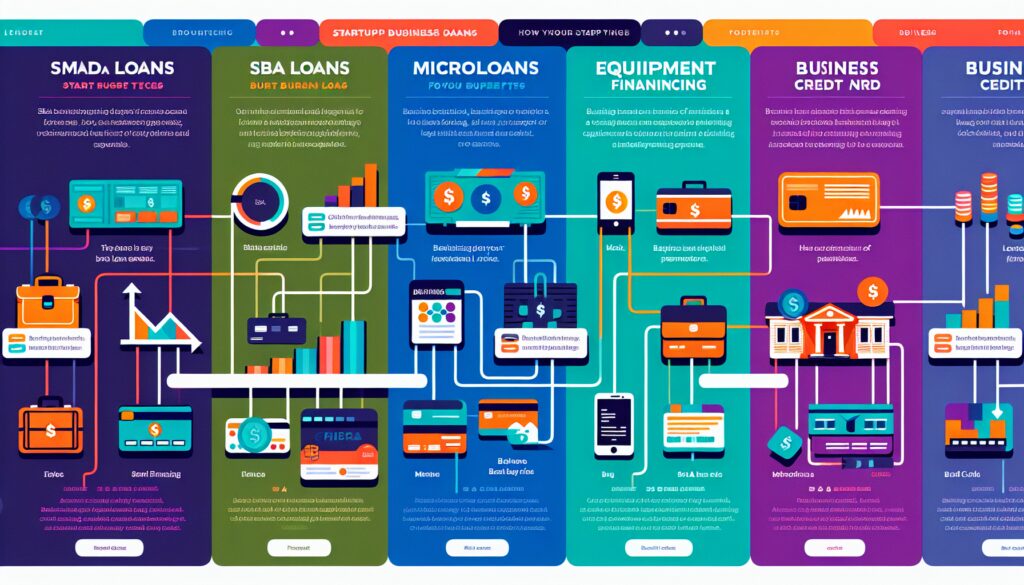Best Startup Business Loans and Start-Up Funding Alternatives
Starting a new business has many challenges, and finding the right funding source is often at the top. This article walks business owners through the best business loans for startups, the different types available, and steps to increase your chances of approval. Whether you need funds for equipment, operational costs, or growth, this guide will help you navigate the options for getting a startup business loan or factoring facility for your new small business.
Small business owners can get a startup line of credit from Bankers Factoring company based on your B2b invoices and not your personal credit score.
Key Takeaways
- Startup loans are crucial for new businesses. They offer flexible application processes but typically higher interest rates than traditional loans.
- Various financing options are available for startups, including Small Business Administration (SBA) loans, microloans, equipment financing, business credit cards, and invoice factoring, each tailored to specific funding needs.
- Preparing a thorough business plan and maintaining good credit scores can significantly improve the chances of securing a startup business loan.
- Small business owners lacking investment capital have choices, no matter their credit situation or capital needs. In 2025, there will be a startup funding loan program for you.
Understanding Startup Business Loans

Securing a startup business loan is critical for new ventures that may not have an extensive credit history yet require financial assistance to manage their initial expenses, purchase equipment, and maintain working capital. Startup loans have stricter eligibility criteria than traditional business loans and bear higher interest rates, covenants, and mandates. Small business administration SBA loans will have a higher cost and interest rate than a bank without the SBA guarantee.
These loans typically cap at around $1 million and offer flexible application processes, making them excellent options for startup financing. Entrepreneurs embarking on new enterprises find tremendous value in pursuing a business loan designed specifically for startups, as it can play a pivotal role in dealing with the intricacies involved in the startup loan application process.
Understanding how startup business loans function is crucial to successfully obtaining funds that could define your venture’s future prosperity or demise. These specialized forms of funding provide newly established companies with essential cash infusions needed for survival or growth.
By selecting an appropriate lending solution from various available start-up financing options, you position yourself to address everyday operational costs or make significant asset investments essential for fostering growth within your fledgling company.
Do you have a Small Business Administration loan in place? We can work with the SBA and still factor your invoices.
Types of Startup Business Loans

Various business loans and financing methods exist to support your startup’s growth, each designed for unique situations and requirements. These include SBA loans, microloans, equipment financing, MCA loans, business credit cards, self-funding, friends/family, and invoice factoring services. Being knowledgeable about each type ensures you can choose wisely.
Investigating the array of loan programs available will demonstrate their advantages in aiding your new enterprise.
Small Business Administration or SBA Loans
Many new businesses gravitate toward Small Business Administration or SBA loans because of their attractive terms and government guarantees.
These financial instruments assist small enterprises by providing accessible financing when other avenues may be unavailable. The U.S. Small Business Administration establishes the rules for these loans, diminishing the risk involved for lenders and increasing their propensity to provide funds to newly established companies. Whether securing long-term fixed assets or supporting daily operations, SBA loans cater to various business requirements.
Many SBA loan types exist, with the 7(a) program being prevalently utilized for sustained financing needs. The SBA Express loan is capped at $350,000 for swift funding processes, while microloans from the same body allow upstarts access up to $50,000, ideal for modest financial necessities. Prospective borrowers must go through an application process that necessitates delineating how they intend to use and repay the borrowed amount supported by a well-conceived business plan—a measure ensuring only those startups exhibiting solid planning and fiscal responsibility gain approval.
To qualify for an SBA loan, firms must adhere to certain prerequisites, such as having a substantial business plan and a satisfactory credit history. This includes meeting minimum credit score demands, although firms with less-than-ideal credit could still receive consideration contingent on aspects such as industry expertise and proof of repayment strength.
The lengthened amortization periods combined with favorable terms position these federally backed tools favorably among fledgling entities, scouting out viable lending options conducive to sustainable growth trajectories.
Microloans
Microloans are advantageous financial solutions for startups seeking modest capital injections. Loan amounts usually fall between $5,000 and $50,000, but they are a viable option for entrepreneurs who may not be eligible for more substantial loans. Various entities, including community banks and microfinance institutions, extend these small-scale loans to support fledgling businesses.
Microloans are particularly suitable for startups requiring swift access to funds for early-stage costs like equipment acquisition or cash flow stabilization. They have less stringent criteria than conventional financing options, serving as an important financial fuel for new ventures needing monetary assistance.
Equipment Financing
Financing equipment permits new businesses to procure essential machinery and tools while using the items they need as security. This financing method is invaluable for companies that depend on costly equipment for their operations but lack the initial funds to buy it directly.
By collateralizing their equipment, startups can obtain the required capital, which helps them maintain cash flow to support various other facets of their business activities. An SBA loan is a good option for equipment financing as they like hard collateral like real estate and equipment.
Business Credit Cards
Startups can leverage business credit cards as a flexible means to access funds for daily expenses, playing an integral role in establishing business credit. They provide a buffer for operational costs and unforeseen expenditures while offering the advantage of avoiding interest by settling monthly balances promptly. Their simple and practical approval procedures make them an appealing source of swift capital.
It is vital to exercise careful management of these cards. Neglecting timely payments might accrue interest charges, incur fees, and harm your company’s credit standing. Card issuers are looking at your credit history, which could affect the FICO score criteria for obtaining such financial tools.
Astute utilization of business credit cards can be instrumental in preserving adequate cash flow and cultivating a robust commercial credit profile for startups. It is also much cheaper than a merchant cash advance.
Invoice Factoring
Invoice factoring is a financial strategy where startups can convert their outstanding invoices into immediate cash by selling them to a lender. This gives businesses with dependable B2B clients swift access to working capital, eliminating the need to wait for payment on those invoices. Companies can secure up to 93% of their invoice’s worth in as little as 24 hours after approval, thus providing an expedient and adaptable option for funding.
The fees associated with this service begin at just 0.95% per month, which often presents a more economical alternative than options like high-interest credit cards or merchant cash advances would provide. Selective factoring allows startups to target accounts receivable for sale, enhancing their ability to handle cash flow effectively.
Invoice Factoring is a fast alternative. Bankers Factoring has a simple encrypted online application. The necessary documents can be attached at the bottom with an online signature. We need a copy of your driver’s license, three months of bank statements, and your open invoice or accounts receivable aging.
Leveraging invoice factoring represents an exceptional approach for startups that sustain consistent cash flows while prioritizing business expansion endeavors.
How to Qualify for a Startup Business Loan

Securing a business loan for your startup requires navigating through a multi-step process. The evaluation of both personal and business credit scores is standard practice, and you might have to provide a personal guarantee that holds you accountable if the company cannot repay its debts. It’s essential to present an elaborate business plan that outlines how funds will be allocated and the strategy for repayment.
A well-structured financial projection within your business plan is key as it highlights your funding requirements while showcasing anticipated growth, which can persuade lenders of your venture’s viability. Ensuring all relevant documentation such as past financial statements and credit reports are readily available can expedite the application process, leading to a more favorable outcome when applying for funding.
Thorough preparation positions startups favorably when approaching lending institutions by demonstrating their dedication and readiness for securing financing. By presenting themselves effectively, new businesses increase their likelihood of being granted approval from lenders.
Best Lenders for Startup Business Loans in 2025
To obtain the optimal business loan for a startup in 2025, it’s crucial to identify an appropriate lender. The choices range from online lenders and credit unions to traditional banks, with each providing distinct advantages and terms. Assessing these options side by side is vital to discover the most suitable match for your company’s requirements.
Online Lenders
Startup financing is increasingly sought after from online lenders who are known for their swift and hassle-free application process. Platforms such as Biz2Credit can get the application done in mere minutes, with funding typically available promptly thereafter. Lendio streamlines this even more. By offering a 15-minute application period followed by fund availability within one day of approval, making these channels a go-to for diverse loan types like business loans, lines of credit, and SBA loans.
For startups seeking financial support through term loans, OnDeck stands out with offerings that range from $5,000 up to $250,000. Competitively priced options are also found at Fundbox where interest rates begin at 4.66%. Bluevine offers an opportunity to secure lines of credit up to $250,000 starting at an annual percentage rate (APR) of only 7.8%.
Online lending platforms showcase flexibility in repayment conditions too. Biz2Credit’s term loans come with payment schedules varying between one to three years while American Express® Business Line of Credit provides various terms—6 months up to two years—with variable monthly fees ranging widely from low single digits (3%) all the way up to near triple figures (27%), influenced largely by how much you borrow.
These digital lending institutions pave the way toward immediate capital procurement due mostly to their efficient processing times coupled with adaptable finance solutions. Thus positioning them as favored entities amongst startup enterprises intent on securing expeditious yet pliant business financing alternatives.
Traditional Banks
Online lenders present an alternative to traditional banks for startup financing, offering greater accessibility and faster processing times. While they tend to have less strict requirements, conventional banks can offer stability and the advantage of established client relationships that aid in ongoing financial planning and support.
Credit Unions
Credit unions provide substantial assistance to new businesses, centering on the growth of local communities and support for emerging entrepreneurs. These institutions extend distinct advantages that include reduced interest rates, less stringent eligibility requirements, and tailored customer service. Prospective borrowers have the option to submit their loan applications with a credit union either digitally or face-to-face while supplying necessary financial details related both personally and to their business.
For startups seeking financial backing, credit unions present an individualized approach which is highly beneficial. Due to their dedication towards community enrichment, these organizations frequently demonstrate greater readiness in aiding new ventures. Startups can capitalize on engaging with credit unions as it facilitates access to loans with attractive terms and fosters enduring fiscal partnerships.
Start-Up Invoice Factoring
Invoice factoring from Bankers factoring is designed for start-ups. One week, you are a nurse working for a staffing company, and the next week, you have started your own staffing firm with a little bit of self funding and help from Bankers Factoring. Please read our article on starting and funding a staffing firm.
Pros and Cons of Startup Business Loans

Loans for startup businesses offer numerous benefits and drawbacks. The advantages include furnishing new enterprises with the funds required to manage upfront expenses, secure necessary equipment, and supply working capital — all of which are vital for the inception and maintenance of a business. In 2022, data revealed that approximately 70% of companies less than two years old utilized loans to support operational expenditures while nearly 67% employed them for growth purposes.
Nevertheless, financial institutions often regard business loans aimed at startups as relatively high-risk due to their lack of proven track records in operation. This perception can result in elevated interest rates and additional costs that may impose a financial strain on fledgling businesses. Many such loans necessitate personal guarantees from borrowers, which could lead to significant monetary jeopardy should they fail to repay.
Individuals considering securing financing through startup loans must consider these positive aspects alongside potential pitfalls with a full appreciation of the fiscal obligations entailed by undertaking such debt before proceeding with an application.
Alternative Funding Options for Startups

Startups have multiple funding choices apart from conventional loans, comprising of venture capital, crowdfunding, and acquiring funds from friends and relatives. Every approach presents distinct advantages and difficulties, thus offering various additional routes to obtain the required financing.
Crowdfunding
Crowdfunding represents a mode of raising capital on the web, where individuals contribute financially to support new businesses without the prerequisite of clearance by a financial institution. This approach enables these early-stage companies to accumulate modest sums from numerous contributors, frequently compensating them with products or incentives for their support. Crowdfunding is particularly appealing due to its minimal risk factor. It allows entrepreneurs to maintain ownership and avoid repayment obligations should their ventures not succeed.
To engage in crowdfunding, an emerging business must set up a campaign on one of various dedicated online platforms designed to pool funds from an expansive network of supporters. Those who participate in funding typically look forward to receiving some form of thank-you gift, which could range from the actual product being developed to exclusive benefits tied into their backing. Beyond mere financing, this strategy serves as a vehicle for fostering a base of enthusiasts and prospective clients who are invested in the startup’s success.
Venture Capital
Securing venture capital funding entails acquiring investment in return for equity and usually includes some degree of company involvement. To attract this type of investment, startups must present a strong business plan that showcases a compelling value proposition and clear potential for expansion. This approach differs from traditional financing because it frequently necessitates relinquishing a measure of control as well as ownership stakes.
Investors who provide venture capital are on the lookout for substantial returns and typically aim to participate actively by taking positions within the board of directors, thus exerting influence over corporate governance. While such partnerships can result in considerable capital inflow along with valuable insights, they come at the cost of sharing both profits and managerial autonomy. It is crucial for startups to consider these consequences thoroughly before seeking out venture capitalists’ funds.
Friends and Family
When personal finances fall short for startup ventures, securing funds through gifts or personal loans from acquaintances such as friends and family can be a valuable option.
Startups should confirm that all parties are at ease with the establishment of a business relationship before proceeding. It’s crucial to formalize the loan by documenting critical details like the loan amount, repayment conditions, interest rates, and any other pertinent information to safeguard transparency and preserve interpersonal relations.
Tips for Improving Your Chances of Getting Approved
Obtaining a startup business loan may present some hurdles, yet employing certain tactics can bolster your prospects of obtaining approval. Ensuring that you have a robust credit score is imperative since lenders assess both personal and business credit histories when making their decisions. It’s vital to handle your credit judiciously.
Should your application for a business loan be initially rejected, remain positive. Investigate why the denial occurred and take steps to improve any weaknesses in either your financial records or business plan. Projecting cash flow can aid in pinpointing avenues for funding, anticipating necessities regarding working capital, and equipping you for prospective fiscal obstacles.
Diligent preparation before applying for a business startup loan improves the likelihood of successfully acquiring the necessary funds to realize your entrepreneurial visions.
Summary
Researching startup business loans can be a complex endeavor, yet grasping the diverse financing choices and their specific prerequisites empowers you to make well-informed financial decisions. There’s a variety of lending types at your disposal, including SBA loans, microloans, invoice factoring, MCA loans, equipment financing, and a business credit card—each presenting distinct advantages as well as potential obstacles. Looking beyond traditional means to alternative funding methods such as crowdfunding or seeking investments from venture capital or opting for personal networks like friends and family could open up more opportunities to procure vital funds needed for both launching and expanding your enterprise.
As you pursue this exciting path of entrepreneurship, bear in mind that careful preparation coupled with a robust business plan is critical in successfully obtaining finances. A clear understanding of the available fiscal routes paired with strategic planning tailored specifically to your entrepreneurial aspirations will help surmount monetary challenges while laying down a foundation conducive to sustained prosperity. Stay persistent. Let your zeal for success propel your startup toward greater achievements.
Frequently Asked Questions
What are the main types of startup business loans available?
The primary startup business loans available are SBA loans, microloans, equipment financing, business credit cards, MCA loans, and invoice factoring. Each option serves different funding needs and business situations, providing various avenues for securing capital.
How can I improve my chances of getting approved for a startup business loan?
Focus on maintaining a strong credit score and developing a detailed business plan to improve your chances of getting approved for a startup business loan. If your application is initially denied, be prepared to address any weaknesses identified by the lender.
What are the benefits of using invoice factoring for startup funding?
Invoice factoring enables startups to enhance their cash flow promptly by liquidating outstanding invoices. This process bolsters financial stability while avoiding additional debt accumulation. Such an approach is essential for efficiently handling operational expenses and fostering the implementation of growth strategies.
Are there alternative funding options besides traditional loans?
Certainly, crowdfunding, venture capital, personal loan lenders, and borrowing money from friends and family represent various alternative financing options. An applicant’s personal credit score will guide you towards the funding options available to you. Bad credit limits those options, including a traditional business loan.
These methods offer more flexible working capital solutions compared to conventional loans when investigating different funding channels.
What documents are typically required for a startup business loan application?
A business owner must prepare financial records, credit histories, existing debt schedules, business bank statements, a comprehensive business plan, and financial forecasts to apply for a startup business loan successfully. Thorough documentation will strengthen your application and increase your chances of approval.
